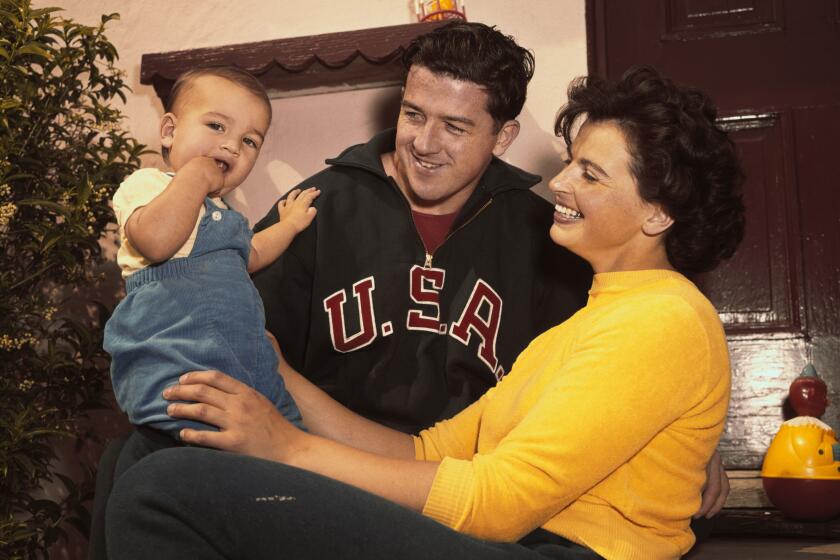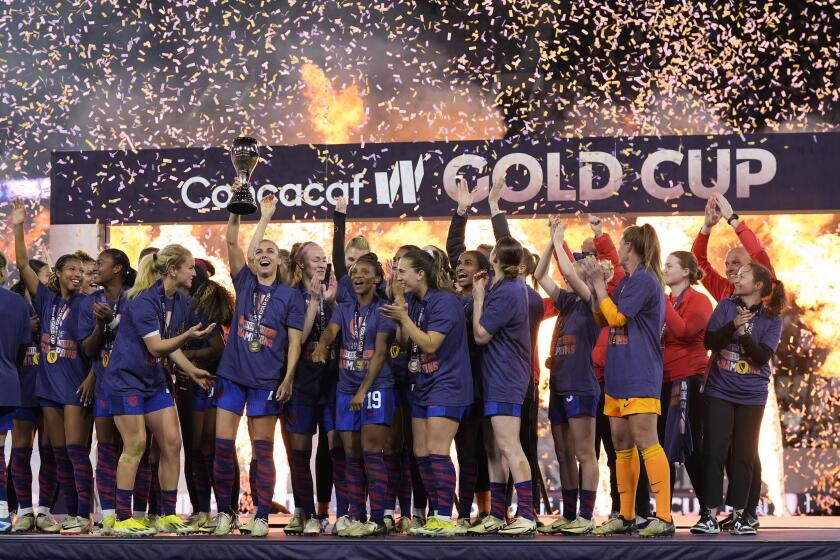Track Federation’s Status in Jeopardy
Alleging that USA Track and Field has failed its anti-doping responsibilities, the U.S. Olympic Committee is weighing a proposal to revoke USATF’s status as this nation’s ruling track and field agency.
Under the proposal, USATF’s membership in the USOC and its recognition as the sport’s “national governing body” would be revoked by Aug. 31 if USATF “does not come into compliance” with anti-doping and other issues, including accounting procedures.
That proposal is evidence of the lingering tension that has frayed the relationship between the two entities in recent months. Last October, citing doping concerns, the USOC suspended funding--about $2 million to $3 million annually--to USATF.
The friction can be traced to USATF’s refusal to identify a member of the U.S. track team at the Sydney Olympics who had tested positive for an anabolic steroid, but was cleared on appeal just before the 2000 U.S. Olympic trials.
USATF maintains that rules in effect at the time of the 1999 test forbade it from identifying the athlete.
The proposal notes that USATF’s “lack of compliance” has “potentially serious international consequences for both USATF and the USOC with the International Olympic Committee and the World Anti-Doping Agency in their efforts to ensure drug-free sport.”
The resolution is due for a vote at the USOC’s next board of directors meeting in Boston April 20-21.
USOC President Sandra Baldwin declined comment Monday. Craig Masback, the chief executive officer of USATF, sought Monday to downplay the significance of the proposal, saying that the “temperature between the USOC and us is extremely low.” But he said the resolution was being taken “seriously,” and added, “We are speaking to the USOC about this situation, trying to find out how we’re out of compliance and how we can remedy this.”
Details of the resolution were mailed in recent days to the 123-member USOC board.
USATF has continued to withhold the athlete’s name despite pressure from the IOC, WADA and the world track and field governing body, the International Amateur Athletic Federation.
In February, in connection with the Salt Lake Winter Games, IOC President Jacques Rogge criticized the USATF for its position. Dick Pound, an IOC member from Canada who serves as chairman of WADA, suggested that the IAAF expel the U.S. federation if it continued to refuse to provide the information.
IAAF President Lamine Diack formally asked the USATF to explain its position but has since been working behind the scenes to achieve a compromise.
Masback stressed Monday that he and Diack have a strong working relationship. Only days ago, the two men were in Monaco, discussing marketing initiatives.
A compromise of sorts was reached a few weeks ago when the USOC resumed funding track and field after USATF officials signed what’s called a “performance partnership agreement,” a contract that says, among other things, that USATF agrees to abide by the U.S. Anti-Doping Agency’s rules and regulations.
Under reforms introduced by USADA, which took over supervision of U.S. athlete drug testing in October 2000, the names of athletes involved in drug cases are routinely made public.
More to Read
Go beyond the scoreboard
Get the latest on L.A.'s teams in the daily Sports Report newsletter.
You may occasionally receive promotional content from the Los Angeles Times.




